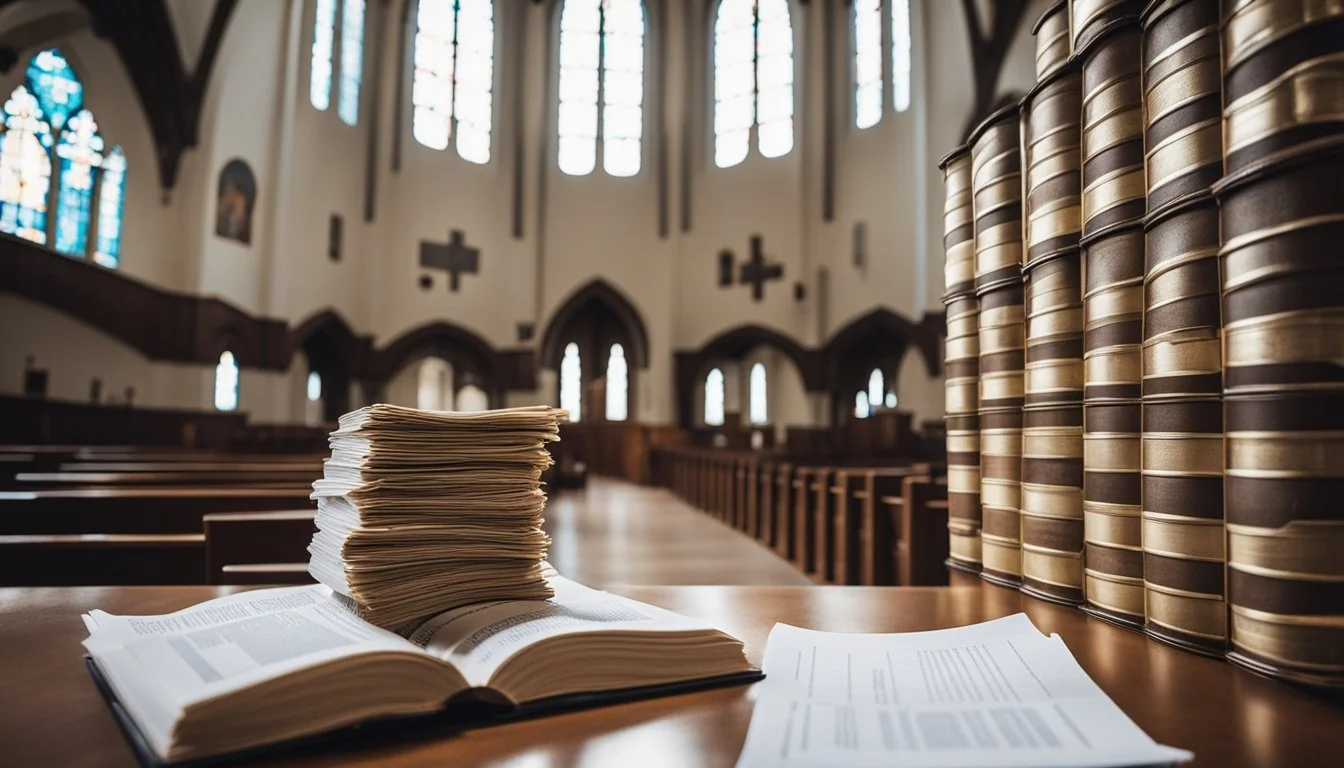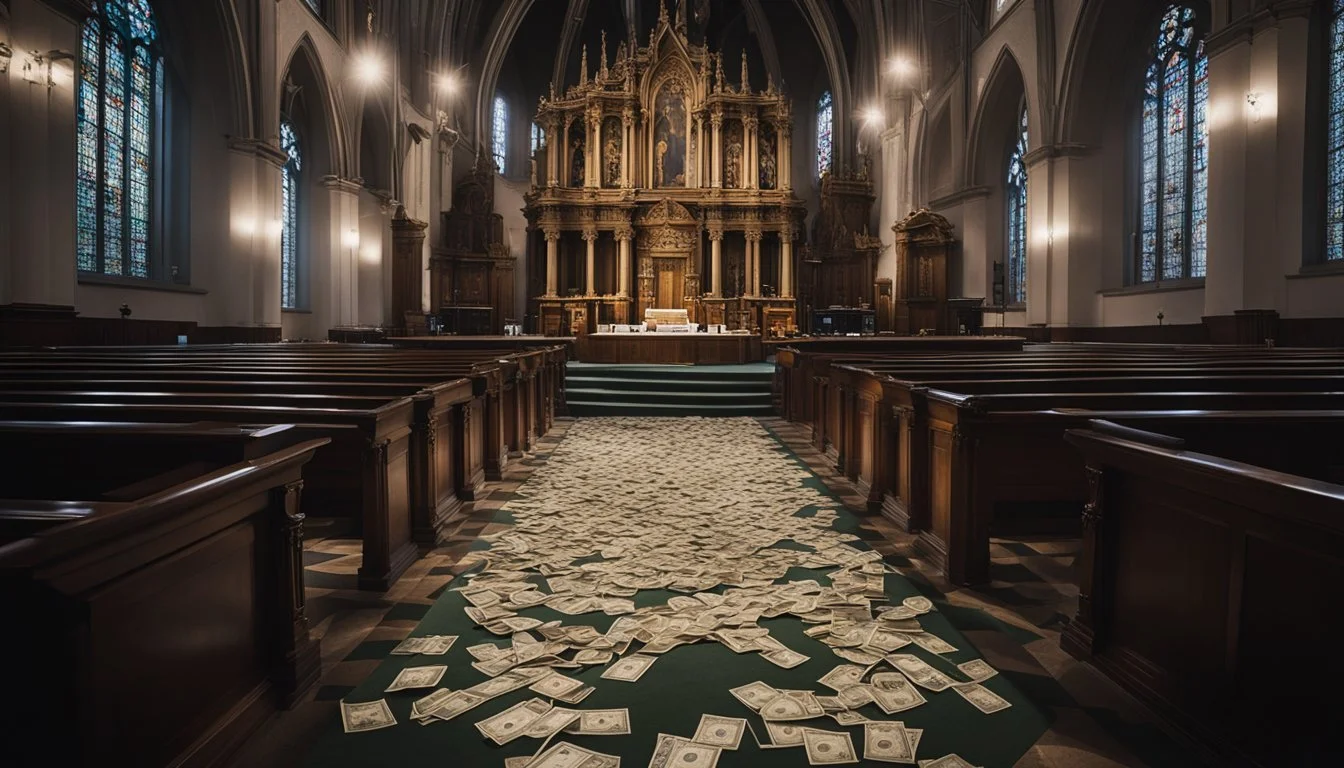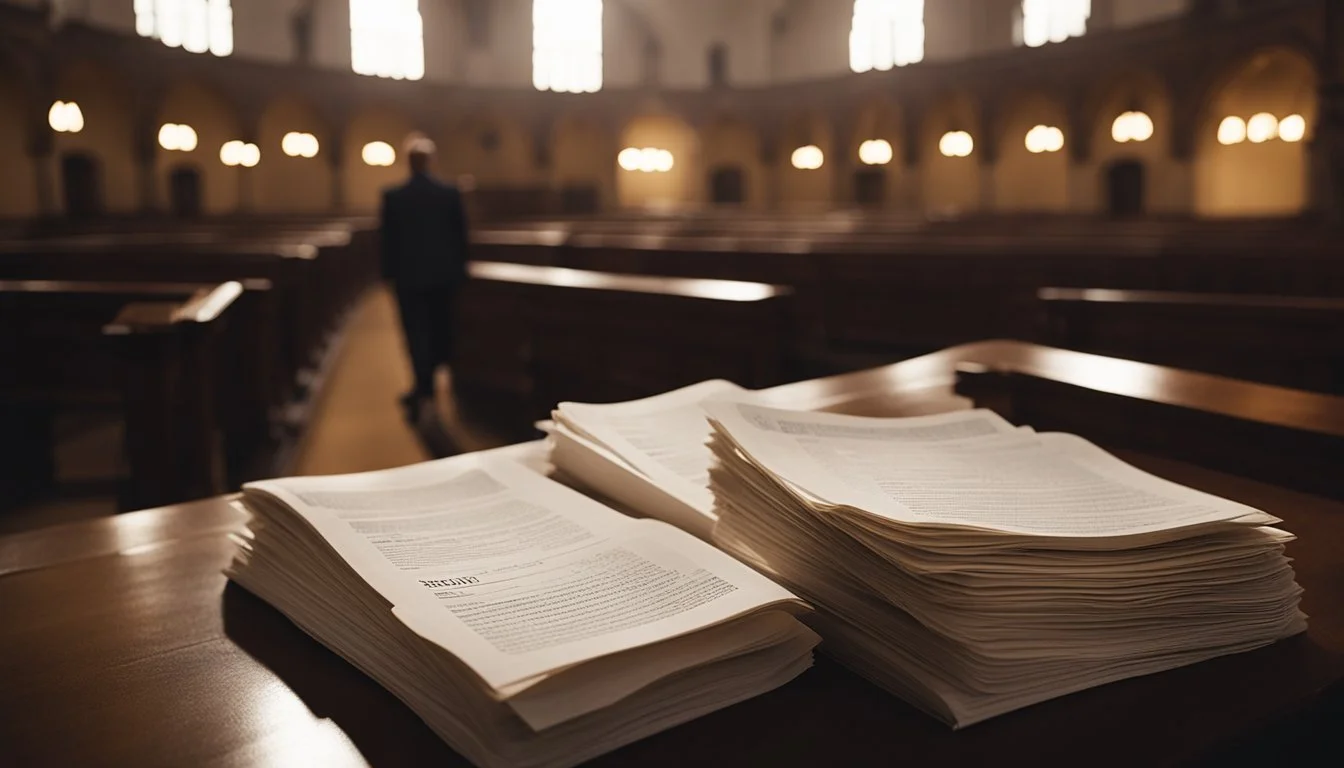8 Gripping Documentaries About Financial Scams in the Catholic Church
Unveiling Deception
Instances of financial fraud within the Catholic Church have increasingly come to light, revealing a web of deceit and misuse of funds that has shocked both parishioners and the general public. Through the lens of documentary filmmaking, these intricate scams are exposed, shedding light on the motivations and methods used by those in positions of trust.
Understanding these complex and often hidden financial schemes is critical for both faith communities and the wider public. Documentaries on this topic not only offer a detailed look at the fraudulent activities but also provide insight into the wider ramifications for the victims and the institutions involved.
1) The Keepers (2017)
"The Keepers," released in 2017, is a seven-part true-crime docuseries on Netflix. It examines the unsolved murder of Sister Cathy Cesnik, a nun and teacher at Archbishop Keough High School in Baltimore.
The series delves into allegations of sexual abuse at the hands of Father Joseph Maskell, a priest at the same school.
The show presents testimonies from former students who claim that the cover-up of Sister Cathy’s murder was linked to these allegations. It sheds light on how the Catholic Church allegedly played a role in protecting perpetrators rather than addressing crimes.
Through interviews and archival footage, "The Keepers" paints a complex picture of institutional corruption.
For more information, visit IMDb.
2) Mea Maxima Culpa: Silence in the House of God (2012)
Mea Maxima Culpa: Silence in the House of God is a documentary film directed by Alex Gibney. It exposes the harrowing instances of clerical sex abuse in the Catholic Church, focusing on the first known protests in the United States led by four deaf men.
The film investigates Father Lawrence Murphy, a priest in Milwaukee who abused over 200 deaf children. The documentary reveals the systemic cover-up of these crimes, extending its probe all the way to the Vatican.
Voices of actors such as Jamey Sheridan, Chris Cooper, Ethan Hawke, and John Slattery are used to portray the deaf interviewees, adding depth to the victims' narratives. The film presents a powerful and chilling account of how power and silence perpetuated abuse.
For more information, visit the Wikipedia page.
3) Holy Hell (2016)
Holy Hell is a documentary directed by Will Allen that delves into the intricate and hidden world of The Buddhafield, a cult Allen was part of for two decades.
As a videographer of the group, Allen captures firsthand footage of the cult's activities, creating a deep, unsettling immersion into its daily operations and inner dynamics.
The film explores the psychological manipulation employed by the cult's leader, Michel, whose theology blends mysticism and self-deification.
Former members recount their experiences, providing a poignant insight into the emotional and financial exploitation suffered by the cult's followers.
Holy Hell is an eye-opening examination of power and control, illustrating how charismatic leaders can exploit faith for personal gain.
For more details, visit Holy Hell on IMDb.
4) Deliver Us from Evil (2006)
"Deliver Us from Evil" is a stark and harrowing documentary directed by Amy J. Berg.
The film delves into the life and crimes of Oliver O'Grady, an Irish Catholic priest. O'Grady admitted to molesting and raping approximately 25 children in Northern California from the late 1970s through the early 1990s.
The documentary highlights the systemic cover-up by the Catholic Church, which continually relocated O'Grady to different parishes. The film presents interviews with his victims and their families, shedding light on the profound impact of his actions.
Amy J. Berg received critical acclaim for her work, winning the Best Documentary Award at the 2006 Los Angeles Film Festival. The documentary was also nominated for an Academy Award for Best Documentary Feature.
For more information on "Deliver Us from Evil," visit Wikipedia.
5) God's Bankers (2015)
Gerald Posner's book, "God's Bankers: A History of Money and Power at the Vatican," delves into the complex financial history of the Vatican. The documentary of the same name sheds light on various financial scandals that have rocked the Catholic Church over centuries.
The film highlights how the Vatican Bank, also known as the Institute for the Works of Religion (IOR), went from relying on donations to becoming an international financial powerhouse. This transformation brought about numerous controversies and scandals.
During World War II, the Vatican allegedly profited from the life insurance policies of Jews sent to death camps. This grim revelation showcases the darker side of the Church's financial dealings during one of history's most tragic periods.
"God's Bankers" also examines the Church's shift towards embracing capitalism in the 20th century. The documentary covers various instances where clerics became financiers, leading to legal and financial misconduct.
From deep investigative reporting to fast-paced storytelling, the documentary provides an insightful look into the intertwining of money, power, and religion within the Catholic Church. Watch "God's Bankers" for a thorough exploration of the Vatican's financial intricacies.
For more information, visit the IMDb page.
6) The Children Act (2017)
Based on Ian McEwan's novel, "The Children Act" focuses on the ethical and moral dilemmas faced by Fiona Maye, a judge in the family division of the High Court.
She navigates complex legal challenges, particularly involving a Jehovah's Witness boy in need of a blood transfusion.
This film explores the intersection of law, religion, and personal beliefs. It doesn't specifically address financial scams in the Catholic Church but provides insight into religious and ethical conflicts in legal settings.
For more information on the film, you can visit The Children Act on IMDB.
7) Spotlight (2015)
"Spotlight" sheds light on the Pulitzer Prize-winning investigation by The Boston Globe's Spotlight team into the Catholic Church's systemic child abuse cover-up.
The film, directed by Tom McCarthy, captures the diligent efforts of journalists uncovering decades of sexual abuse by priests, which church leaders had concealed.
Michael Keaton stars as Walter Robinson, leading a dedicated team that methodically unveils the extent of the scandal.
"Spotlight" offers an unflinching look at journalism's role in exposing corruption and holding powerful institutions accountable.
For more information, visit Wikipedia.
8) All the Queen's Horses (2017)
"All the Queen's Horses" provides a detailed look at one of the largest municipal fraud cases in U.S. history.
It centers on Rita Crundwell, who embezzled $53 million from Dixon, Illinois, over two decades. As the city's comptroller, Crundwell funneled public funds into a secret account.
She used the stolen money to build a leading quarter horse breeding empire while Dixon faced budget cuts and neglect.
Released in 2017, the documentary captures the shocking scale of Crundwell's theft and its impact on the small town. Directed by Kelly Richmond Pope, it sheds light on the broader issues of trust and oversight in government.
For more information, visit the IMDB page.
Historical Context
The financial history of the Catholic Church is marked by a blend of devout stewardship and notorious controversies. Significant events and practices illuminate the intricate relationship between faith and finance.
Financial Practices in the Catholic Church
The Catholic Church’s financial practices have evolved substantially throughout its history. Traditionally, the Church relied heavily on donations, tithes, and bequests from the faithful. These funds supported various ecclesiastical activities, including the construction of grand cathedrals and charitable works.
As time progressed, the Church expanded its financial operations. Investments in property and art became common, and the establishment of the Vatican Bank in the 1940s marked a significant development. The bank aimed to manage assets more efficiently and support global Church missions.
Notable Scandals Through the Ages
Several financial scandals have marred the Catholic Church’s history. One of the most infamous incidents involved the Vatican Bank in the 1980s, where fraudulent transactions led to significant losses and criminal investigations. The downfall of Banco Ambrosiano, linked to the Vatican Bank, exposed widespread corruption and questionable dealings.
Another striking example is the controversy surrounding the misuse of donations and assets in the 2000s, leading to prominent trials and reforms. These events underscored the urgent need for transparency and accountability within the Church’s financial operations.
Key Figures and Organizations
This section explores the pivotal roles played by key figures in financial scams within the Catholic Church and highlights the organizations involved in investigating these crimes.
Influential Leaders Involved
Several high-ranking church officials and external actors have been implicated in financial scams within the Catholic Church. One notable figure is Archbishop Paul Marcinkus, who once led the Vatican Bank and faced allegations of money laundering. Another significant name is Cardinal Angelo Becciu, removed from his position amidst accusations of embezzlement relating to church funds.
Others deserving mention include Monsignor Nunzio Scarano, also known as "Monsignor 500," due to his frequent €500 note withdrawals. He was arrested for fraud and corruption, highlighting the scope of financial wrongdoings tied to high-level clergy members.
Investigative Bodies
Various organizations and entities have been instrumental in uncovering financial scams within the Catholic Church. The Vatican’s own Financial Information Authority (AIF) plays a crucial role in monitoring financial transactions and reporting suspicious activities.
In a global context, law enforcement agencies such as the Italian Guardia di Finanza have conducted probes leading to numerous arrests and convictions. Independent media organizations and investigative journalists have also contributed significantly to exposing financial frauds, providing in-depth reports and uncovering hidden financial misconduct.
Impact and Aftermath
The exposure of financial scams within the Catholic Church has led to significant repercussions. This section explores the damaging effects on the Church's credibility and the legal and financial implications.
Effect on Church Credibility
Revelations of financial scams in the Catholic Church have deeply affected its credibility. The trust that parishioners and the public once had in the Church has been undermined. Many believers feel betrayed, leading to a decline in church attendance and donations.
For example, high-profile cases involving embezzlement of church funds and lavish spending by clergy members have dominated headlines. Such scandals reveal a stark contrast to the Church's teachings on humility and charity. This disparity has caused a rift, especially among younger and more progressive members.
Furthermore, media coverage has played a significant role in shaping public perception. Continuous exposure of financial misconduct has perpetuated a narrative of corruption, making it challenging for the Church to regain its reputation. Efforts to address these issues, such as financial transparency and accountability measures, are essential to restoring faith among the congregation.
Legal and Financial Repercussions
The legal and financial repercussions of financial scandals in the Catholic Church are extensive. Several dioceses have faced expensive lawsuits, resulting in substantial financial settlements. These legal battles drain church resources, which could be used for charitable activities and community support.
Moreover, criminal investigations have led to the prosecution of individuals involved in fraudulent activities. Church officials found guilty of misusing funds face significant prison sentences and fines. Such legal consequences not only serve as a deterrent but also highlight the seriousness of financial misconduct.
Financially, the Church has had to sell properties, reduce staff, and cut back on services. These measures are taken to cover the costs of settlements and legal fees. The financial strain impacts the Church’s ability to support its missions and damages its ability to operate effectively.








